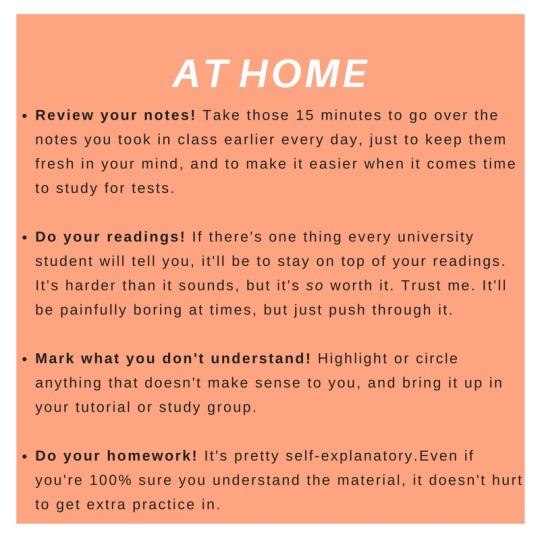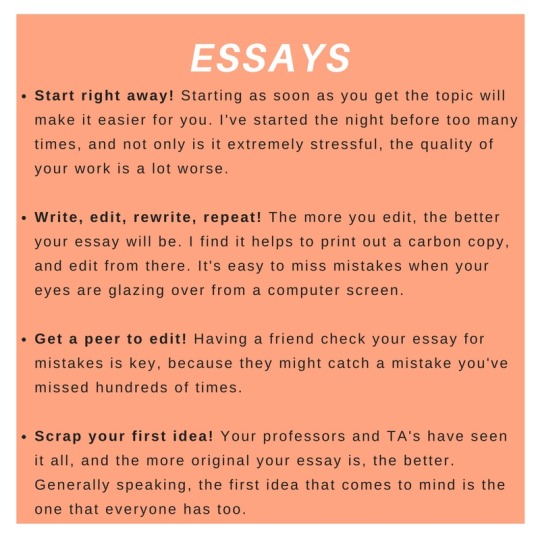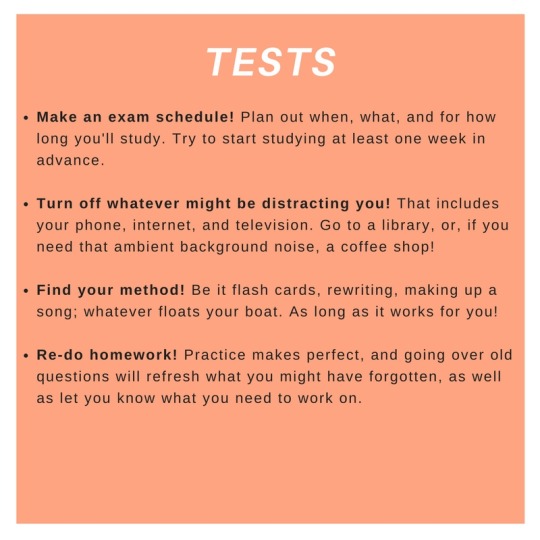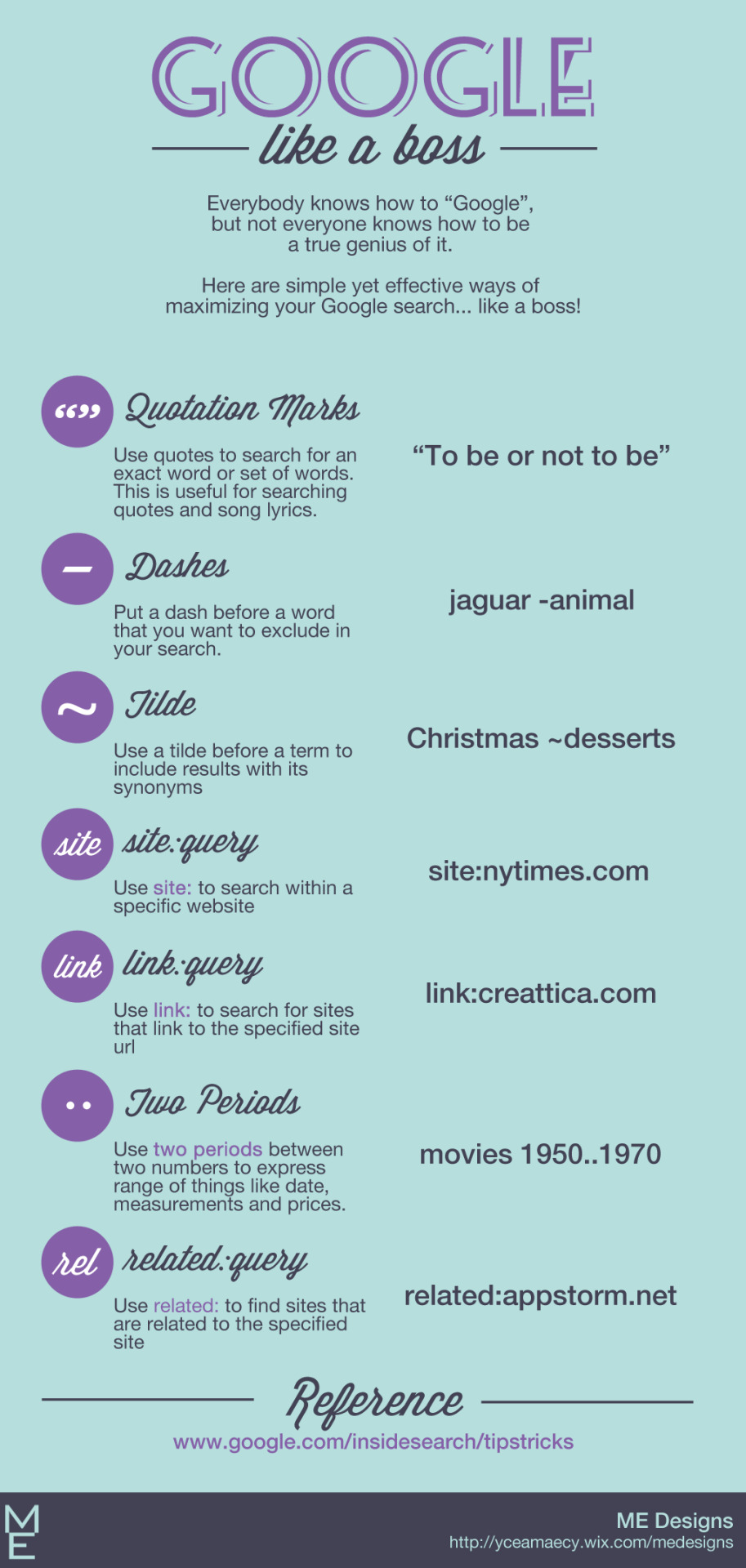Photo
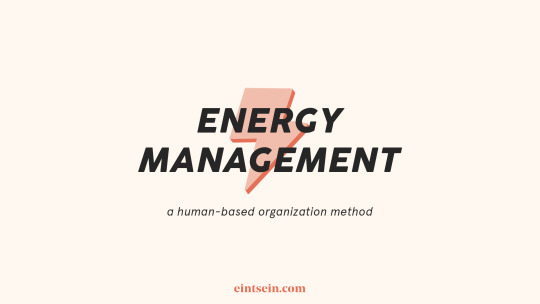
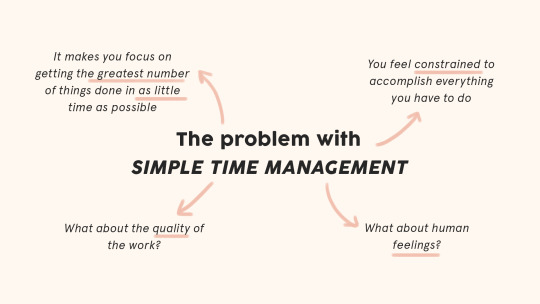
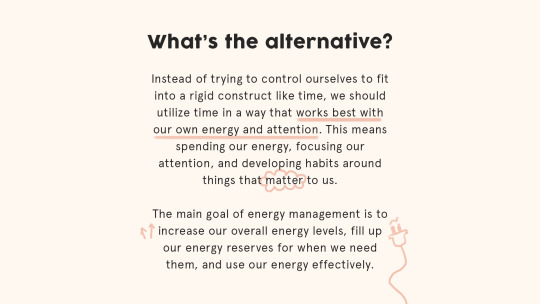
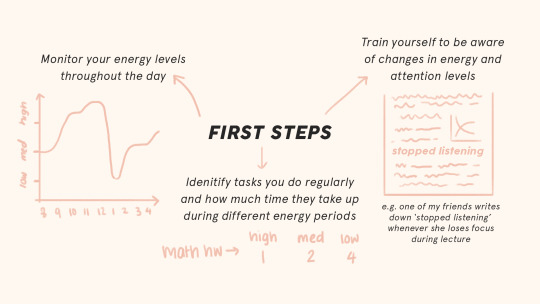

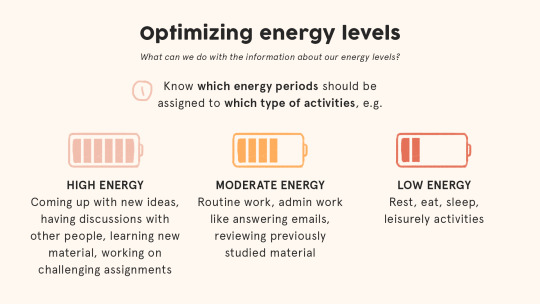
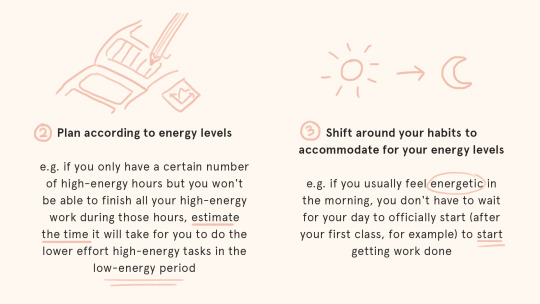
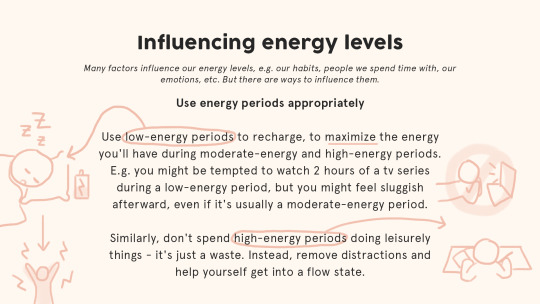
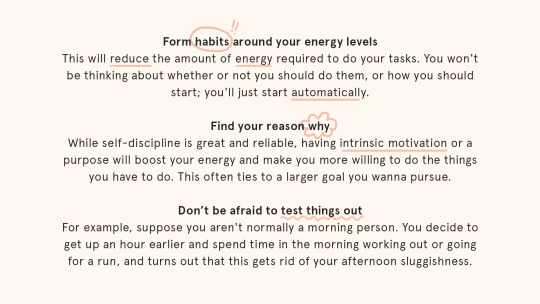
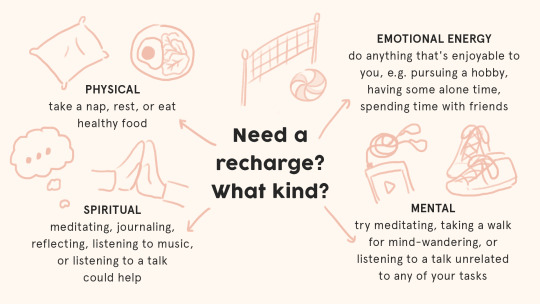
Energy Management
A human-based organization method
click on images for better resolution; images also available here (link to google drive)
Other posts that may be of interest:
Getting stuff done: How to deal with a lack of motivation
Flexible time-blocking: A more breathable way to get things done
The ABCDE Method
30K notes
·
View notes
Text
Tips to learn a new language
The 75 most common words make up 40% of occurrences
The 200 most common words make up 50% of occurrences
The 524 most common words make up 60% of occurrences
The 1257 most common words make up 70% of occurrences
The 2925 most common words make up 80% of occurrences
The 7444 most common words make up 90% of occurrences
The 13374 most common words make up 95% of occurrences
The 25508 most common words make up 99% of occurrences
(Source: 5 Steps to Speak a New Language by Hung Quang Pham)
This article has an excellent summary on how to rapidly learn a new language within 90 days.
We can begin with studying the first 600 words. Of course chucking is an effective way to memorize words readily. Here’s a list to translate into the language you desire to learn that Derek Roger suggested! :)
EXPRESSIONS OF POLITENESS (about 50 expressions)
‘Yes’ and ‘no’: yes, no, absolutely, no way, exactly.
Question words: when? where? how? how much? how many? why? what? who? which? whose?
Apologizing: excuse me, sorry to interrupt, well now, I’m afraid so, I’m afraid not.
Meeting and parting: good morning, good afternoon, good evening, hello, goodbye, cheers, see you later, pleased to meet you, nice to have met.
Interjections: please, thank you, don’t mention it, sorry, it’ll be done, I agree, congratulations, thank heavens, nonsense.
NOUNS (about 120 words)
Time: morning, afternoon, evening, night; Sunday, Monday, Tuesday, Wednesday, Thursday, Friday, Saturday; spring, summer, autumn, winter; time, occasion, minute, half-hour, hour, day, week, month, year.
People: family, relative, mother, father, son, daughter, sister, brother, husband, wife; colleague, friend, boyfriend, girlfriend; people, person, human being, man, woman, lady, gentleman, boy, girl, child.
Objects: address, bag, book, car, clothes, key, letter (=to post), light (=lamp), money, name, newspaper, pen, pencil, picture, suitcase, thing, ticket.
Places: place, world, country, town, street, road, school, shop, house, apartment, room, ground; Britain, name of the foreign country, British town-names, foreign town-names.
Abstract: accident, beginning, change, color, damage, fun, half, help, joke, journey, language, English, name of the foreign language, letter (of alphabet), life, love, mistake, news, page, pain, part, question, reason, sort, surprise, way (=method), weather, work.
Other: hand, foot, head, eye, mouth, voice; the left, the right; the top, the bottom, the side; air, water, sun, bread, food, paper, noise.
PREPOSITIONS (about 40 words)
General: of, to, at, for, from, in, on.
Logical: about, according-to, except, like, against, with, without, by, despite, instead of.
Space: into, out of, outside, towards, away from, behind, in front of, beside, next to, between, above, on top of, below, under, underneath, near to, a long way from, through.
Time: after, ago, before, during, since, until.
DETERMINERS (about 80 words)
Articles and numbers: a, the; nos. 0–20; nos. 30–100; nos. 200–1000; last, next, 1st–12th.
Demonstrative: this, that.
Possessive: my, your, his, her, its, our, their.
Quantifiers: all, some, no, any, many, much, more, less, a few, several, whole, a little, a lot of.
Comparators: both, neither, each, every, other, another, same, different, such.
ADJECTIVES (about 80 words)
Color: black, blue, green, red, white, yellow.
Evaluative: bad, good, terrible; important, urgent, necessary; possible, impossible; right, wrong, true.
General: big, little, small, heavy; high, low; hot, cold, warm; easy, difficult; cheap, expensive; clean, dirty; beautiful, funny (=comical), funny (=odd), usual, common (=shared), nice, pretty, wonderful; boring, interesting, dangerous, safe; short, tall, long; new, old; calm, clear, dry; fast, slow; finished, free, full, light (=not dark), open, quiet, ready, strong.
Personal: afraid, alone, angry, certain, cheerful, dead, famous, glad, happy, ill, kind, married, pleased, sorry, stupid, surprised, tired, well, worried, young.
VERBS (about 100 words)
arrive, ask, be, be able to, become, begin, believe, borrow, bring, buy, can, change, check, collect, come, continue, cry, do, drop, eat, fall, feel, find, finish, forget, give, going to, have, have to, hear, help, hold, hope, hurt (oneself), hurt (someone else), keep, know, laugh, learn, leave, lend, let (=allow), lie down, like, listen, live (=be alive), live (=reside), look (at), look for, lose, love, make, may (=permission), may (=possibility), mean, meet, must, need, obtain, open, ought to, pay, play, put, read, remember, say, see, sell, send, should, show, shut, sing, sleep, speak, stand, stay, stop, suggest, take, talk, teach, think, travel, try, understand, use, used to, wait for, walk, want, watch, will, work (=operate), work (=toil), worry, would, write.
PRONOUNS (about 40 words)
Personal: I, you, he, she, it, we, they, one; myself, yourself, himself, herself, itself, ourselves, yourselves, themselves.
Possessive: mine, yours, his, hers, its, ours, theirs.
Demonstrative: this, that.
Universal: everyone, everybody, everything, each, both, all, one, another.
Indefinite: someone, somebody, something, some, a few, a little, more, less; anyone, anybody, anything, any, either, much, many.
Negative: no-one, nobody, nothing, none, neither.
ADVERBS (about 60 words)
Place: here, there, above, over, below, in front, behind, nearby, a long way away, inside, outside, to the right, to the left, somewhere, anywhere, everywhere, nowhere, home, upstairs, downstairs.
Time: now, soon, immediately, quickly, finally, again, once, for a long time, today, generally, sometimes, always, often, before, after, early, late, never, not yet, still, already, then (=at that time), then (=next), yesterday, tomorrow, tonight.
Quantifiers: a little, about (=approximately), almost, at least, completely, very, enough, exactly, just, not, too much, more, less.
Manner: also, especially, gradually, of course, only, otherwise, perhaps, probably, quite, so, then (=therefore), too (=also), unfortunately, very much, well.
CONJUNCTIONS (about 30 words)
Coordinating: and, but, or; as, than, like.
Time & Place: when, while, before, after, since (=time), until; where.
Manner & Logic: how, why, because, since (=because), although, if; what, who, whom, whose, which, that.
240K notes
·
View notes
Text
things I wish i would have known my first year of University
1) Make an outline for your papers. it doesn’t have to be detailed but having one will help you keep on track when writing. it will only take you a few minutes to brainstorm one.
2) always carry a spare charger and a backup battery for your phone. honestly, our phones are an extension of us now, so nothing is scarier than when it dies halfway through your class. a backup battery and a charger are always handy.
3) set smaller deadlines and stick to them. you might flounder if you decide to have your 2000 word essay all done and edited for March 14. but you might have an easier time deciding to have 500 words written by March 8, 1000 words by March 10, 1500 words by March 11, 2000 words by March 13, and to edit it on the 14th. these smaller deadlines have really helped me to get my work done and to not to stress about deadlines. splitting up my assignments into smaller chunks makes it more manageable.
4) email your professors if you have questions. or go to their office when they’re in. don’t sit there in confused silence, it won’t help.
5) Do practise Self-care and take breaks. these don’t always have to be full days off with a spa day. it can be having a bubble bath after studying for hours, or watching a movie that makes you laugh after finishing an essay. or just making sure you're eating healthy and drinking water.
6) do put important dates in your calendar. weather its a psychical calendar, or one on your phone/ computer. I have all my major dates on my computer laptop, it helps when I am studying and wondering when I have an exam or need to remember when to hand in a paper.
7) always have a highlighter, a pencil, a pen, and spare paper. you never know when you’re going to have a pop quiz or an activity in class.
8) reach out to friends and spend time with them/ your family. people tend to isolate themselves during exam/paper/midterm season. while you definitely need to study, you also need to have social connections. make a study date at your library or even get a coffee with a friend.
5K notes
·
View notes
Photo

FAMOUS AUTHORS
Classic Bookshelf: This site has put classic novels online, from Charles Dickens to Charlotte Bronte.
The Online Books Page: The University of Pennsylvania hosts this book search and database.
Project Gutenberg: This famous site has over 27,000 free books online.
Page by Page Books: Find books by Sir Arthur Conan Doyle and H.G. Wells, as well as speeches from George W. Bush on this site.
Classic Book Library: Genres here include historical fiction, history, science fiction, mystery, romance and children’s literature, but they’re all classics.
Classic Reader: Here you can read Shakespeare, young adult fiction and more.
Read Print: From George Orwell to Alexandre Dumas to George Eliot to Charles Darwin, this online library is stocked with the best classics.
Planet eBook: Download free classic literature titles here, from Dostoevsky to D.H. Lawrence to Joseph Conrad.
The Spectator Project: Montclair State University’s project features full-text, online versions of The Spectator and The Tatler.
Bibliomania: This site has more than 2,000 classic texts, plus study guides and reference books.
Online Library of Literature: Find full and unabridged texts of classic literature, including the Bronte sisters, Mark Twain and more.
Bartleby: Bartleby has much more than just the classics, but its collection of anthologies and other important novels made it famous.
Fiction.us: Fiction.us has a huge selection of novels, including works by Lewis Carroll, Willa Cather, Sherwood Anderson, Flaubert, George Eliot, F. Scott Fitzgerald and others.
Free Classic Literature: Find British authors like Shakespeare and Sir Arthur Conan Doyle, plus other authors like Jules Verne, Mark Twain, and more.
TEXTBOOKS
Textbook Revolution: Find biology, business, engineering, mathematics and world history textbooks here.
Wikibooks: From cookbooks to the computing department, find instructional and educational materials here.
KnowThis Free Online Textbooks: Get directed to stats textbooks and more.
Online Medical Textbooks: Find books about plastic surgery, anatomy and more here.
Online Science and Math Textbooks: Access biochemistry, chemistry, aeronautics, medical manuals and other textbooks here.
MIT Open Courseware Supplemental Resources: Find free videos, textbooks and more on the subjects of mechanical engineering, mathematics, chemistry and more.
Flat World Knowledge: This innovative site has created an open college textbooks platform that will launch in January 2009.
Free Business Textbooks: Find free books to go along with accounting, economics and other business classes.
Light and Matter: Here you can access open source physics textbooks.
eMedicine: This project from WebMD is continuously updated and has articles and references on surgery, pediatrics and more.
MATH AND SCIENCE
FullBooks.com: This site has “thousands of full-text free books,” including a large amount of scientific essays and books.
Free online textbooks, lecture notes, tutorials and videos on mathematics: NYU links to several free resources for math students.
Online Mathematics Texts: Here you can find online textbooks likeElementary Linear Algebra and Complex Variables.
Science and Engineering Books for free download: These books range in topics from nanotechnology to compressible flow.
FreeScience.info: Find over 1800 math, engineering and science books here.
Free Tech Books: Computer programmers and computer science enthusiasts can find helpful books here.
CHILDREN’S BOOKS
byGosh: Find free illustrated children’s books and stories here.
Munseys: Munseys has nearly 2,000 children’s titles, plus books about religion, biographies and more.
International Children’s Digital Library: Find award-winning books and search by categories like age group, make believe books, true books or picture books.
Lookybook: Access children’s picture books here.
PHILOSOPHY AND RELIGION
Bored.com: Bored.com has music ebooks, cooking ebooks, and over 150 philosophy titles and over 1,000 religion titles.
Ideology.us: Here you’ll find works by Rene Descartes, Sigmund Freud, Karl Marx, David Hume and others.
Free Books on Yoga, Religion and Philosophy: Recent uploads to this site include Practical Lessons in Yoga and Philosophy of Dreams.
The Sociology of Religion: Read this book by Max Weber, here.
Religion eBooks: Read books about the Bible, Christian books, and more.
PLAYS
ReadBookOnline.net: Here you can read plays by Chekhov, Thomas Hardy, Ben Jonson, Shakespeare, Edgar Allan Poe and others.
Plays: Read Pygmalion, Uncle Vanya or The Playboy of the Western World here.
The Complete Works of William Shakespeare: MIT has made available all of Shakespeare’s comedies, tragedies, and histories.
Plays Online: This site catalogs “all the plays [they] know about that are available in full text versions online for free.”
ProPlay: This site has children’s plays, comedies, dramas and musicals.
MODERN FICTION, FANTASY AND ROMANCE
Public Bookshelf: Find romance novels, mysteries and more.
The Internet Book Database of Fiction: This forum features fantasy and graphic novels, anime, J.K. Rowling and more.
Free Online Novels: Here you can find Christian novels, fantasy and graphic novels, adventure books, horror books and more.
Foxglove: This British site has free novels, satire and short stories.
Baen Free Library: Find books by Scott Gier, Keith Laumer and others.
The Road to Romance: This website has books by Patricia Cornwell and other romance novelists.
Get Free Ebooks: This site’s largest collection includes fiction books.
John T. Cullen: Read short stories from John T. Cullen here.
SF and Fantasy Books Online: Books here include Arabian Nights,Aesop’s Fables and more.
Free Novels Online and Free Online Cyber-Books: This list contains mostly fantasy books.
FOREIGN LANGUAGE
Project Laurens Jz Coster: Find Dutch literature here.
ATHENA Textes Francais: Search by author’s name, French books, or books written by other authors but translated into French.
Liber Liber: Download Italian books here. Browse by author, title, or subject.
Biblioteca romaneasca: Find Romanian books on this site.
Bibliolteca Virtual Miguel de Cervantes: Look up authors to find a catalog of their available works on this Spanish site.
KEIMENA: This page is entirely in Greek, but if you’re looking for modern Greek literature, this is the place to access books online.
Proyecto Cervantes: Texas A&M’s Proyecto Cervantes has cataloged Cervantes’ work online.
Corpus Scriptorum Latinorum: Access many Latin texts here.
Project Runeberg: Find Scandinavian literature online here.
Italian Women Writers: This site provides information about Italian women authors and features full-text titles too.
Biblioteca Valenciana: Register to use this database of Catalan and Valencian books.
Ketab Farsi: Access literature and publications in Farsi from this site.
Afghanistan Digital Library: Powered by NYU, the Afghanistan Digital Library has works published between 1870 and 1930.
CELT: CELT stands for “the Corpus of Electronic Texts” features important historical literature and documents.
Projekt Gutenberg-DE: This easy-to-use database of German language texts lets you search by genres and author.
HISTORY AND CULTURE
LibriVox: LibriVox has a good selection of historical fiction.
The Perseus Project: Tufts’ Perseus Digital Library features titles from Ancient Rome and Greece, published in English and original languages.
Access Genealogy: Find literature about Native American history, the Scotch-Irish immigration in the 19th and 20th centuries, and more.
Free History Books: This collection features U.S. history books, including works by Paul Jennings, Sarah Morgan Dawson, Josiah Quincy and others.
Most Popular History Books: Free titles include Seven Days and Seven Nights by Alexander Szegedy and Autobiography of a Female Slave by Martha G. Browne.
RARE BOOKS
Questia: Questia has 5,000 books available for free, including rare books and classics.
ARTS AND ENTERTAINMENT
Books-On-Line: This large collection includes movie scripts, newer works, cookbooks and more.
Chest of Books: This site has a wide range of free books, including gardening and cooking books, home improvement books, craft and hobby books, art books and more.
Free e-Books: Find titles related to beauty and fashion, games, health, drama and more.
2020ok: Categories here include art, graphic design, performing arts, ethnic and national, careers, business and a lot more.
Free Art Books: Find artist books and art books in PDF format here.
Free Web design books: OnlineComputerBooks.com directs you to free web design books.
Free Music Books: Find sheet music, lyrics and books about music here.
Free Fashion Books: Costume and fashion books are linked to the Google Books page.
MYSTERY
MysteryNet: Read free short mystery stories on this site.
TopMystery.com: Read books by Edgar Allan Poe, Sir Arthur Conan Doyle, GK Chesterton and other mystery writers here.
Mystery Books: Read books by Sue Grafton and others.
POETRY
The Literature Network: This site features forums, a copy of The King James Bible, and over 3,000 short stories and poems.
Poetry: This list includes “The Raven,” “O Captain! My Captain!” and “The Ballad of Bonnie and Clyde.”
Poem Hunter: Find free poems, lyrics and quotations on this site.
Famous Poetry Online: Read limericks, love poetry, and poems by Robert Browning, Emily Dickinson, John Donne, Lord Byron and others.
Google Poetry: Google Books has a large selection of poetry, fromThe Canterbury Tales to Beowulf to Walt Whitman.
QuotesandPoem.com: Read poems by Maya Angelou, William Blake, Sylvia Plath and more.
CompleteClassics.com: Rudyard Kipling, Allen Ginsberg and Alfred Lord Tennyson are all featured here.
PinkPoem.com: On this site, you can download free poetry ebooks.
MISC
Banned Books: Here you can follow links of banned books to their full text online.
World eBook Library: This monstrous collection includes classics, encyclopedias, children’s books and a lot more.
DailyLit: DailyLit has everything from Moby Dick to the recent phenomenon, Skinny Bitch.
A Celebration of Women Writers: The University of Pennsylvania’s page for women writers includes Newbery winners.
Free Online Novels: These novels are fully online and range from romance to religious fiction to historical fiction.
ManyBooks.net: Download mysteries and other books for your iPhone or eBook reader here.
Authorama: Books here are pulled from Google Books and more. You’ll find history books, novels and more.
Prize-winning books online: Use this directory to connect to full-text copies of Newbery winners, Nobel Prize winners and Pulitzer winners.
555K notes
·
View notes
Text
ewwwwwwwwwwwwwwwwwwwwwwwwwwwwwwwwwwwwwwwwwww
writing adult emails is awful
its like
hi [name of person],
this formatting is making me uncomfortable but I have to tell you something / ask you something that is vital to my career as a student.
I re-read and edited that sentence for an hour, but you’ll probably just glance over it for half a second.
thanks!
- [name]
721K notes
·
View notes
Text
How to Deal with Study Burnout
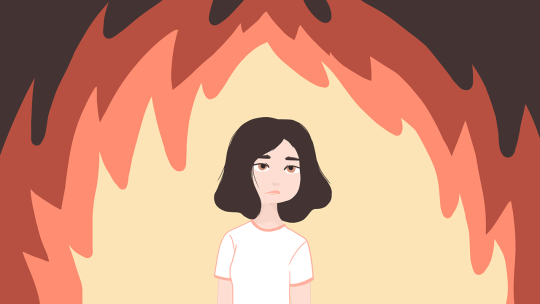
As students in this day and age, it’s quite common for us to juggle rigorous academic responsibilities and overwhelming extracurricular activities. As a result, we might feel burnt out. But what exactly is burnout?
Burnout is when you feel physically and mentally exhausted as a result of constantly lacking the energy required to fulfill the demands of your studying.
Burnout can be broken down into three parts:
Exhaustion is what causes you to feel tired all the time and unable to concentrate. You could also get sick or have trouble sleeping.
Cynicism or depersonalization is when you feel disconnected from those around you, e.g. your friends and family.
Inefficacy is a decrease in productivity, efficiency, or quality of your work.
How do you know if you have burnout?
Symptoms may vary, but they include:
Being unable to absorb new information
Intellectual exhaustion
Decreasing academic performance and productivity
Feeling like you need to prove yourself
Making yourself work even more, even though you’re exhausted or being unwilling to study further
Neglecting your needs
Long term fatigue
Showing disinterest in things you normally enjoy, e.g. hobbies or friends
Denying that something’s wrong with you (may manifest in the form of aggression)
Avoiding social interaction
Feeling empty and depressed
What can I do to fix it?
Here are some short term solutions for dealing with burnout.

1. Take a power nap
Power naps are life changing. They help you recharge your energy and get you ready to start working again. They also improve learning, memory, creativity, alertness, and mood. I would recommend napping for 30 minutes at most, because anything more will lead to a longer sleep session.
Optional: drink coffee before your nap - something that takes a short while to consume like a shot of espresso - so that you’ll feel alert and revitalized afterwards!
2. Take a shower
A cold one will wake you up, but a warm one will calm you down. I suggest starting with warm water, then ending with cold water.
3. Exercise
Whether it’s playing soccer or doing yoga, the important thing is to get moving! Exercise releases endorphins or happy hormones that help you combat stress.
4. Run a quick errand
This will help take your mind off things while also getting something done! You’ll also end up walking, which is technically a form of exercise.
5. Call or visit a friend
Sometimes what we’re lacking is social interaction, and hanging out with a friend definitely helps. Whether it’s providing you with a distraction or giving emotional support, your friends are always there to help you. Plus, science has shown that being with friends reduces your cortisol (stress hormone) levels.
6. Eat a snack
Preferably a healthy one. Eat something with proteins, vitamins, and fibers to boost your mood. Here’s a list of mood boosting foods.
7. Surf the web
This requires A TON of discipline, but it’s definitely a game changer. Surfing the web is one of the most relaxing things you could do. I personally look for a good laugh during my study breaks, so I’d watch a comedy or scroll through memes to get those happy hormones up and running.
8. Do an activity you find interesting, e.g. a hobby
We all need happiness in our lives, and our hobbies are perhaps the best way to find that joy. You could sit down with a page turning adventure, or go outside and shoot hoops, or listen to a podcast, or even bullet journal, as long as you’re having a good time.
9. Listen to music
Music is one of the ways we gain energy, so I always make time for it during the day. However, you should choose the right music, because not all the music you love is going to make you feel energized. For me, it’s pop punk with hard hitting beats, thundering guitars, and really upbeat, enthusiastic vocals. Some of you might be energized by mellow music with dreamy vocals that make you feel like you’re floating in the clouds. If you choose the wrong music, you might just end up feeling sluggish and drained.
10. Get some fresh air
Your brain needs 20% of the oxygen in your body. Fresh air brings more oxygen to your brain so that you can think more clearly, feel less tired, and concentrate more easily.
How do I make sure I don’t get it in the future?
Avoiding study burnout in the long term has a lot to do with our study habits - as well as our daily habits. We need to make sure that our bodies and minds receive the things they need, and that we aren’t overworking them.
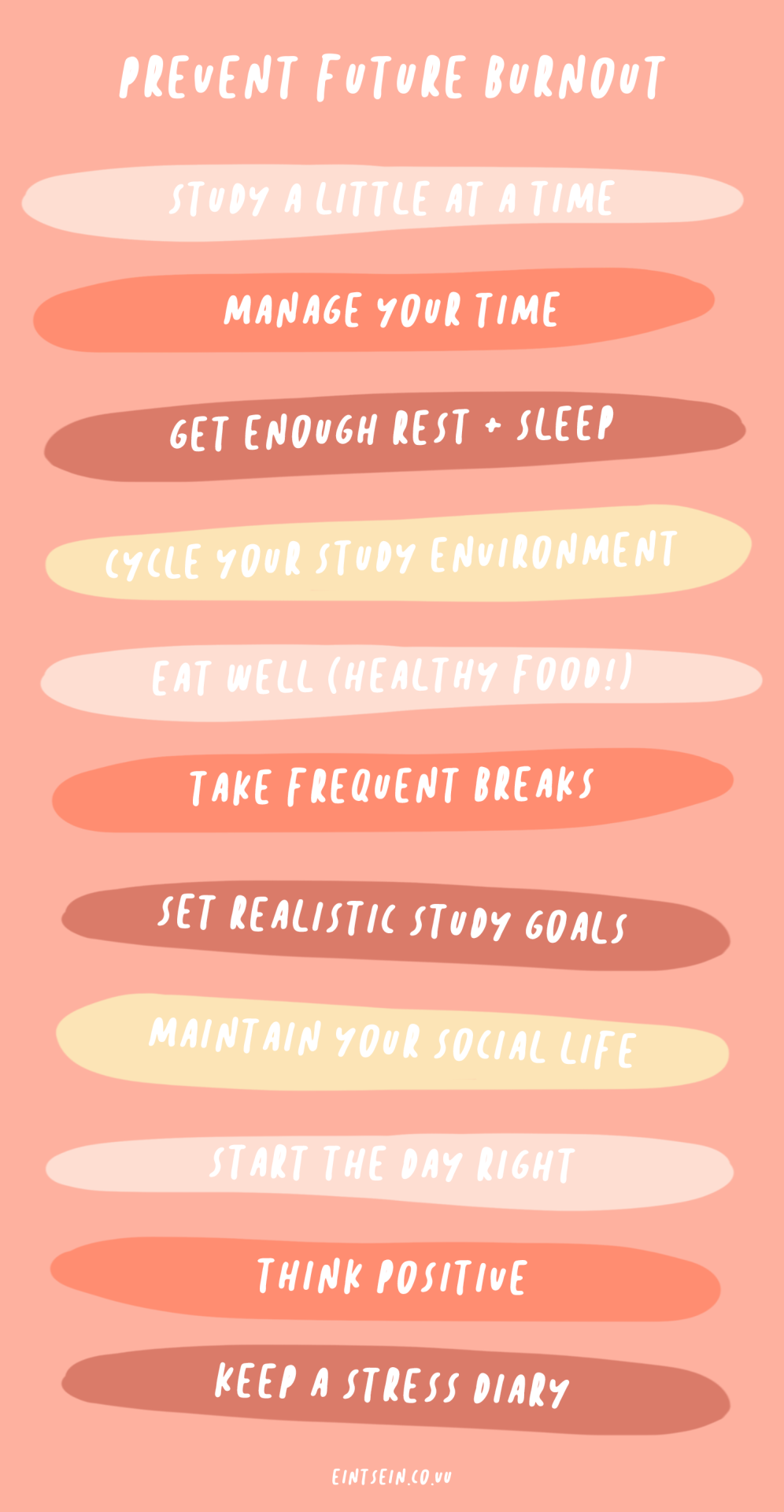
1. Study a little at a time
Break up your notes into smaller, more easily digestible pieces and learn a little at a time. This way, you’re not overwhelming your brain, and you have time to let that new knowledge settle in.
2. Time management
Having a good study schedule is crucial in preventing burnout. You don’t want to force yourself to work at your slow hours. Aside from that, you definitely shouldn’t leave things until the last minute, and sticking to a schdule will help you pace yourself. Here’s a post I wrote on How to Make an Efficient Revision Schedule and How to Beat Procrastination.
3. Get enough rest
I cannot stress enough that sleep is so important for you. It improves your cognitive functioning and also enhances your mood, making it less likely that you’ll get burnt out. Make sure to take power naps, too, if you feel like you need them.
You also really shouldn’t pull all-nighters. Sleep is also involved in cementing memories in your brain, so if you study a little before you sleep, you’re bound to remember more than if you studied a chapter during an all nighter.
Having trouble sleeping? Here’s a post I made about my night routine and how to get better sleep.
4. Cycle your study environments
Your body and mind are bound to get tired from being in the same location for prolonged periods of time. The best way to fix that is to study in different places: at your desk, your backyard, the dining table, a cafe, a friend’s house, the library, etc.You should find a frequency that works for you. I like to switch it up every 2-3 days; some people change locations every week.
5. Eat well
As I’ve mentioned before, healthy foods with protein, vitamins, and fiber greatly improve your mood and your physical health. Proper nutrition will give your brain the power it needs to push through. Also make sure not to skip meals; honestly you’ll just end up feeling terrible afterwards.
6. Take frequent breaks
Let’s face it, we’re human, we’re bound to get tired from studying for a long time. Taking breaks enables our brains to digest the information we just learned in a pace that works for it. Breaks also help us focus on something other than studying, so that when we do get back to it, we’ll be ready to digest even more information.
7. Set realistic study goals
You’re gonna memorize all 500 pages of your biology textbook in one day? Good luck with that. Some of you might be compulsive studiers, but this kind of habit isn’t very good for your brain or your physical health. Studies have shown that excess studying can lead to lower productivity, fatigue, and - you guessed it - burnout. In the end, this will result in lower academic performance, perhaps even in the long run. So instead of trying to study so much in one sitting or one day, break up your material into chunks.
8. Maintain your social life
Wherever you lie on the introvert-extrovert spectrum, everyone needs social interaction once in a while. It keeps you sane and healthy. Go out with your friends, have a sleepover, or maybe even a study date.
9. Start the day right
What we do in the morning can significantly affect our mood for the rest of the day. Sometimes we don’t even feel like getting up in the morning, or doing anything that day. One thing you should do is create a morning routine you enjoy to jumpstart your day. Here are 8 Morning Habits for Productivity.
10. Think positive
When we’re feeling burnt out, it’s hard to not think negatively about everything. In reality, that just makes our condition worse. So think positively! Start small, like congratulating yourself for getting out of bed today, and then work your way up to bigger accomplishments, like finishing 2 chapters of your textbook.
11. Keep a stress diary
This is kind of a new concept for me, but it’s really great. How it works is that each day, you would write down all the things that made you stressed and how they made you stressed. This will help you identify the things you’re doing that’s causing your burnout, e.g.
Too long study hours? take regular breaks
Too much time in the same place? cycle your study environment
Not eating properly? set aside time to eat healthy meals at least 2 times a day
Not doing the things you love? schedule in time for that, e.g. during your long breaks
Not getting enough human interaction? make a study group
Too much negative thinking? adopt a positive mindset (you can always start small)
Not getting enough sleep? fix your sleep schedule
And that’s all I have for you guys this time. Hope these tips will help you manage your stress and study burnout whenever you have them. And if you have any questions, don’t hesitate to drop an ask!
P.S. if any of you want to see the images in this post in better quality, click here (link to google drive)
29K notes
·
View notes
Text
one of my friends found radiooooo which is a site that streams music from any country from any decade (well, most countries/decade combos work) and we’ve been digging going on a quest to find what is rad
so far the following is good
50s/60s/70s/80s russia
70s cambodia
20s japan
80s ethiopia
80s india
178K notes
·
View notes
Photo





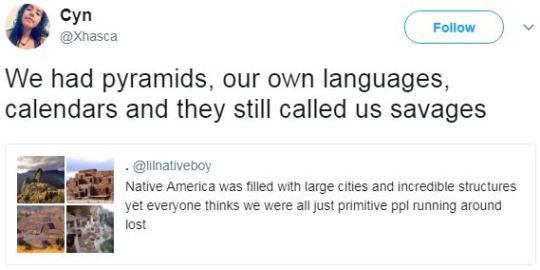
I learned in a Latin Studies class (with a chill white dude professor) that when the Europeans first saw Aztec cities they were stunned by the grid. The Aztecs had city planning and that there was no rational lay out to European cities at the time. No organization.
554K notes
·
View notes
Photo

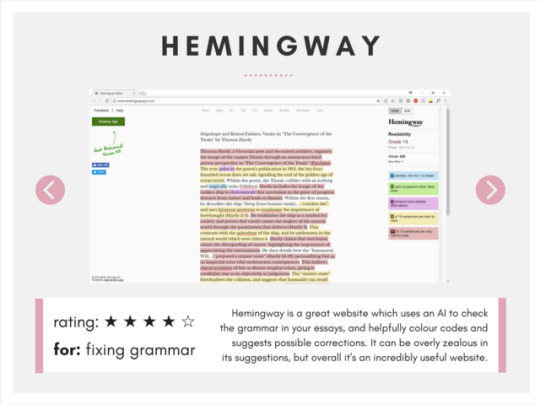

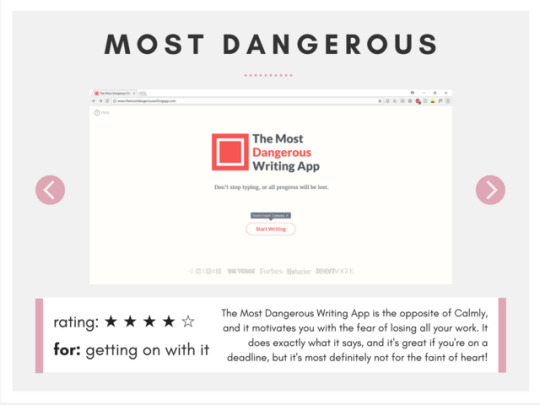
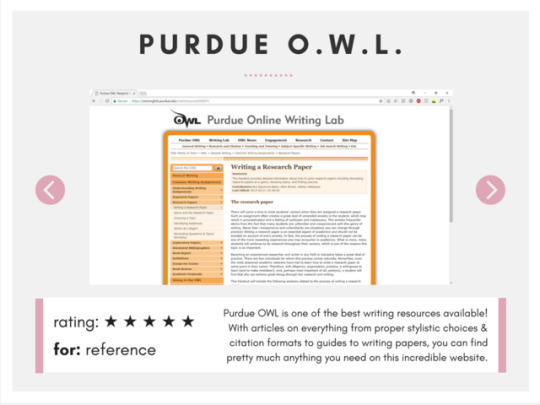

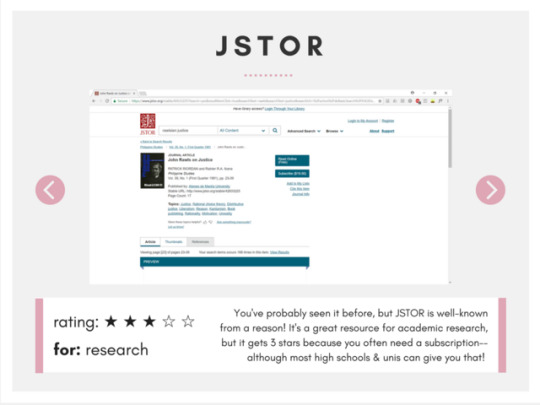

Here’s some weapons for your essay writing arsenal!
Hemingway Editor
Calmly Writer
The Most Dangerous Writing App
Purdue O.W.L.
One Look Thesaurus
JSTOR
Google Scholar
Reply with your favourite or other great websites I didn’t include!
71K notes
·
View notes
Photo

Free Study Planning Printable Pages!
Here are several worksheets to help you better plan, prepare and complete your studies! The page of 10 pages includes daily, weekly and monthly study planners, pages to help track and monitor your studies, and sheets to evaluate how that studying is going. The download links are below:
Monday start set download link
Sunday start set download link
You can see other free printables here :-) The ‘Priority Break Down’ sheet is inspired and explained here. Here is an example on how to use each page.
I hope you enjoy using and customising these printables! If you upload a photo featuring it, I’d love to see. Please tag me on Tumblr with #emmastudies or on Instagram with @emmastudiess. You can see other people using my printables by visiting the #esprintables tag on my blog! Please remember, these printables are for personal use only and should not be redistributed as your own.
If you want to find more organisational printables and support me, please check out my Etsy shop with lots of downloads dedicated to students. You can use ‘student10′ to get 10% off any purchase! :-)
Other posts | Printables | Instagram | Youtube | Pinterest | Etsy Shop | Ko-fi
8K notes
·
View notes
Text
When you guys have visited potential apartments, what kind of questions did you ask besides the basics like what rent and utilities include?
225K notes
·
View notes
Note
It's sad to see an actual archeologist believe that white archeologist destroyed statues' noses to hide the fact that they're black. As if all African people have a "stereotypical" black nose. Also LOADS of Roman and Greek statues have their noses missing. It's sad how this website feeds people lies and yall blindly take it as truth.
I will start by saying I am not an Egyptologist. I have never studied Egyptian history or archaeology. My background is mainly in Mediaeval European history. I did learn a little, though, about historical scholarship and the development of archaeology prior to the 20th century, including the fact that, yeah, it was hella racist.
Scientific racism (i.e., the attempted use of science and pseudo-science to “prove” white superiority) first arose in the 17th century. When interest in Egyptology exploded in the early 19th century, and Europeans began to realize the richness, complexity, and great achievements of Ancient Egyptian culture, there was strong incentive among European scholars to “prove” that such a clearly advanced civilization could not possibly have been the work of Africans. If Ancient Egyptians were African, it discredited the idea that Europeans were superior, and made the enslavement of African people more difficult to justify.
Scholars of the time pointed to the lack of stereotypical African physical features and skin pigmentation (usually red for men and yellow for women) in Ancient Egyptian figural art, among other things, as evidence supporting their claims that Ancient Egyptians were of European origin, or were at least not African. These kinds of racist ideas are still being perpetuated into the present, in the form of whitewashed movie depictions, and absurd theories about aliens building the Pyramids.
Am I aware that there are a lot of other ancient noseless statues? Obviously. Do I think every noseless Egyptian statue is the result of a racist conspiracy? Of course not. Weathering happens. Careless excavation happens. Some were likely intentionally defaced in antiquity for the same reasons that images of controversial or unpopular figures today are frequently defaced.
Rarely is anything definitive in archaeology, especially when it comes to specifics. People outside the field may find it disappointing and dissatisfying to realize that archaeology is not about definitively proving this or that specific thing happened. We rely on theories supported by evidence. We start from “Hmmm, there sure are a whole lot of noseless Egyptian statues. I wonder why that might be?” and develop theories from there based on as many clues as we can gather, but no, we cannot ever say with absolute certainty, “This particular statue has no nose because racism.”
Did some European scholars and archaeologists in the 18th and 19th century go around surreptitiously striking the noses off Egyptian statues to support a white supremacist agenda? Based on what we know of the history, it is a strong possibility. However, they would never have confessed to doing such a thing in writing; that would have defeated the purpose. We can, however, look at such things as physical evidence of statues’ noses being intentionally struck off (chisels often leave distinctive marks), and roughly how long ago, based on the weathering of the broken surface compared to the rest of the statue, that was likely to have happened.
312 notes
·
View notes
Photo
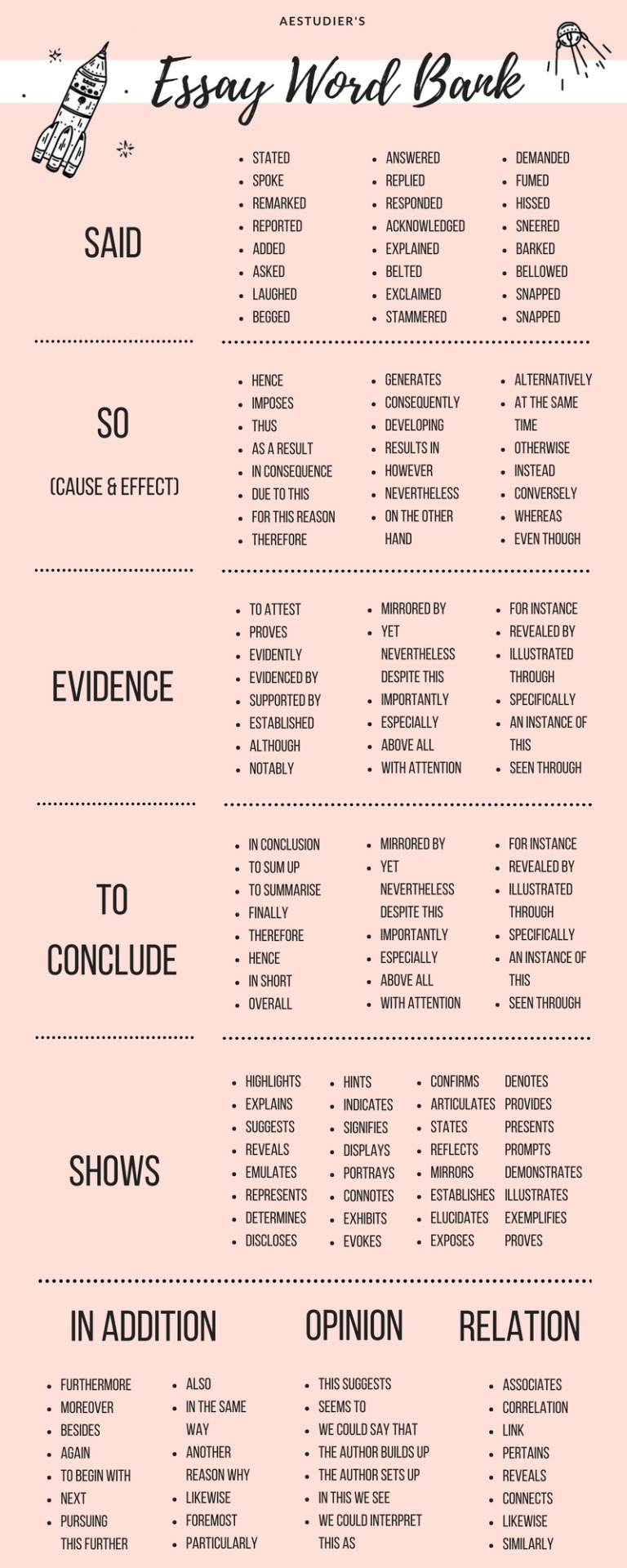
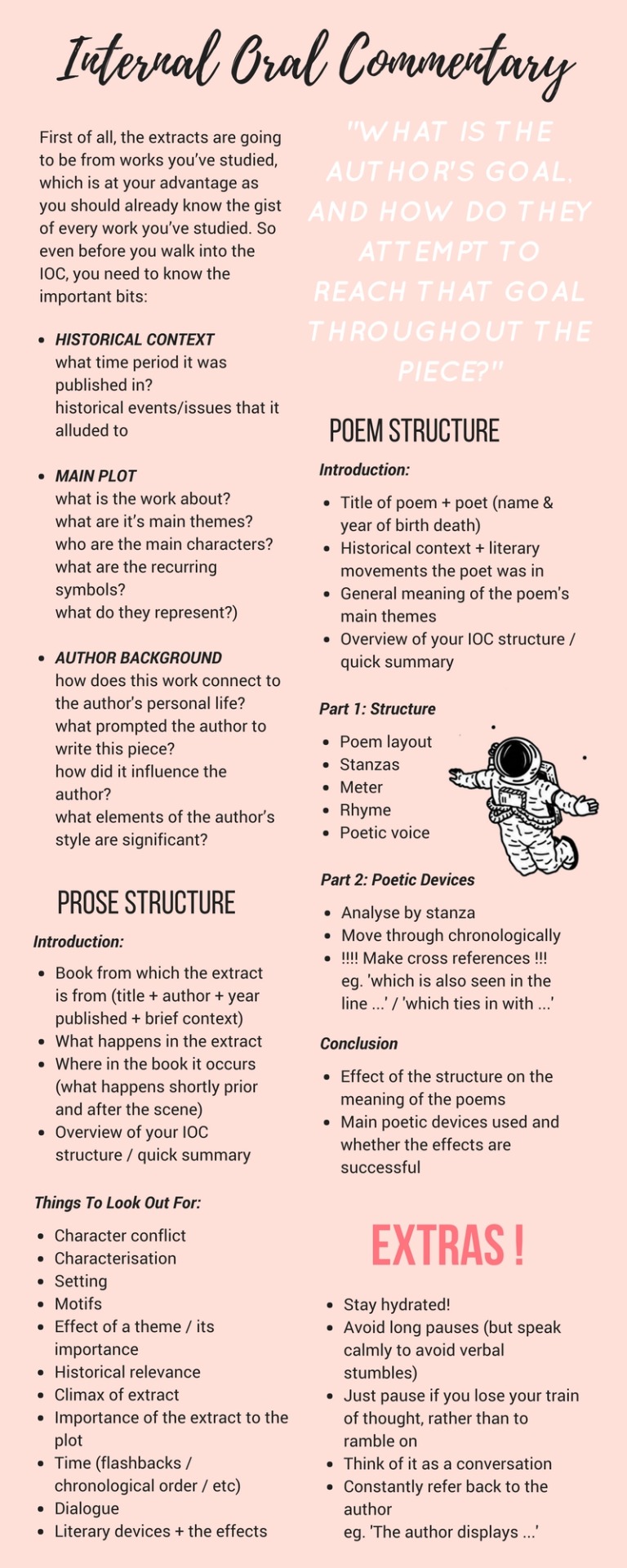
Just completed and submitted the final version of my Extended Essay !!! °˖✧◝(⁰▿⁰)◜✧˖°
So I compiled lists of words that I found super super useful in making it easier for me to finish any essay !! Here is a masterpost of some sort with transition words + key vocabs grouped together for easy access as well as an IB IOC ‘cheat sheet’ I used for my english LAL orals last year (though most commentaries follow a similar structure so its generalisable) ~
Good luck with your essays !!!
… oops just realised I forgot to bullet point one of the lists
41K notes
·
View notes
Photo
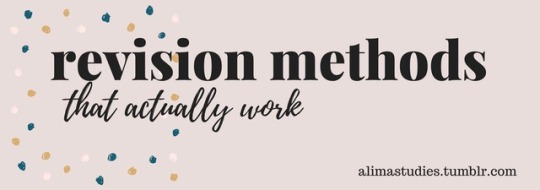
revision methods that actually work // studygram: alimastudies
1. Memory mind map
Personally, this is the most effective one for me. All you need is a blank piece of paper. Pick a sub-topic that you are doing e.g in biology a topic could be immune system and the sub-topic could be antibodies and antigens. If you want you can create some questions for each sub-topic and on your blank piece of paper, using questions as a guide, write everything you know about that sub-topic without your notes. After get your notes out and check and correct with a different colour pen. Watch this video to get a better understanding
2. Flashcards
I recommend you use written flashcards, unless you have vocab or definitions in which case digital ones like quizlet is fine. You should have questions on one side and your answers on another - i’ve heard people say the answer shouldn’t be long but i find that the more detailed it is the higher marks you score in the exam - of course summarise don’t just copy from a textbook or there is no point in doing this. When you test yourself try to do something else other than reading, for example write the answer down and then check and correct.
3. Spaced intervals
No point cramming for an exam. Yes it might have got you an A* in GCSE or other lower level exams but it’s certainly not going to get you an A* for a-levels or other higher exams. Space your learning out and if you can try and revise everyday, even if somedays are just for half an hour, DO IT! It will help you in the long term. Don’t revise one subject/unit for a whole day, space it out. For example don’t revise like this: AABBCC, revise like this instead: ABCBCA or something along those lines.
4. Mind maps
My favourite revision source!!! For some reason in an exam ( i only use mind maps for essay based subjects) i can remember where i put each point on my mind map which helps me write my essays and retrieve my information more in the long term! Don’t make it boring by trying to be ‘minimal’ - ADD COLOUR !!! But to stay within limits, too many colours can make it look overwhelming and confusing !
5. Teaching someone else
Either teach your younger siblings or pretend you are teaching to an imaginary class - while it may seem crazy it works, trust me. Use a whiteboard to help you illustrate your ideas! This method will help you identify any gaps in your knowledge and you’ll truly see if you know something well enough to explain it. If you cannot explain it to a six year old then you truly have not got the grasp of it, as Albert Einstein says!
6. past papers
Honestly, this should be the last thing for your revision, unless you have not left enough time to revise all the content and you are running out of time then past papers should be the first thing you do. Do these properly, don’t do it just to see what gaps you have in your knowledge- genuinely do it as if it is a real exam. This will help you see how well you can apply the content you have memorised for an exam. It will also get you familiar with the mark scheme which will help you get as close as full marks !!!
10K notes
·
View notes
Text
when mental illness affects your studies
all of us mentally ill students finally reach a point where we think it’s so, so hard that we are unable to keep going, keep studying, keep living like this. I have reached that point again recently, but this time reached out for help, and am now trying to learn how to function at school now that I’ve come to terms with my illness. so, I thought I could share some advice based on my own experience.
to you who are now struggling, please don’t give up. do just that. you can overcome this and that is a fact.
-
for the love of God, tell your teachers.
sadly, deadlines don’t really care if you’re currently at your lowest point or just happen to be ‘in shape’ for completing assignments – you have to hand them in on This Day, period. But sometimes you feel so bad that you are either completely unable to finish that one essay or end up forcing yourself to write it and do it while gritting your teeth and crying like I did with my History essay earlier this year. when receiving feedback from my teacher (negative, of course, because the essay was utter shite), I wanted to answer her question why it was SO bad with ‘I am just very, very sick’ and ‘Please don’t think I’m not ambitious or hardworking anymore, I was doing my very best to deliver this and I’m sorry it’s bad’… but I didn’t. I was too afraid that she would think I was lying and too lazy to write a good essay, and that she wouldn’t understand. A few months later, my headteacher and I had a conversation during which she asked me if she should tell my teachers about what I’m going through, and never before in my life have I felt as relieved as in that moment when I was saying ‘Yes, please’.
not having to worry about what your teachers are going to think about the actions caused by your illness can be life-saving. If you think they won’t understand your struggle, you’re probably wrong – you are not the first and only student suffering from depression, anxiety or other mental illness; they have met many like you in the past and know exactly how to act to take some weight off your shoulders, and trust me, they will do everything they can to make it easier for you.
change is good (really)
if you think there is no way out of your situation, stop for a minute, talk to someone, and change whatever you can, even if there’s only a tiny, tiny chance it will make you feel better and take some weight off your shoulders.
i thought I was stuck with Computer Science on Higher Level – although I try my hardest to understand what it’s about, I get grades below average and am really disappointed in myself. It became one of my biggest struggles, and I’m not even planning to become a programmist… It has been making my depression worse for a whole year, but I didn’t do anything to change it, just kept wishing I had picked Biology last year. I mentioned it during a conversation with a trusted teacher and she thought of a solution, asking me if I wanted to change my Language A level to Higher and then take up Biology on SL. And I was like ?? Life-changing?? Of course, I will have to study hard during the summer holidays to catch up with a year worth of material, but I’m more than willing to do that if it means not having to hear about Computer Science ever again. and once again, so much weight off my shoulders. Why I haven’t even thought of making that change before is a topic for another discussion, but my point here is, go make that change if you can. If there is another door, open it. Although it’s scary, it’s definitely worth it.
don’t suit your goals, make your goals suit you
one thing really hard to accept is that an accomplishment for you, a mentally ill student, might be different than an accomplishment for a healthy student. For you, passing this class alone may be a goal, not necessarily with the highest marks, while others strive for straight A’s. You have to understand that, in order not to add more to your worries, you need to have a realistic approach. For me, it was the hardest part, because I’m usually really ambitious and have a tendency to set the bar too high or compare myself to others. But what I needed to realise was that others are not ill, and I am, and if an achievement for me is something that they do effortlessly, there is nothing to be ashamed of. I am the sick me and they are the healthy them, and that is fine.
find a good therapist
therapy, carried out well, can save your life, and I’m sure you already know that (because everyone keeps repeating that, literally everywhere, and it’s becoming highly annoying). I hadn’t realised that, though, until I experienced it myself. I have been suffering for almost two years before I finally scared myself so much that I needed to find a therapist as soon as possible, as I realised I was slowly becoming dangerous to myself and therefore people close to me. I was lucky enough to find a good specialist right away, who quickly diagnosed me, sent to a psychiatrist that prescribed me medicine, and continued therapy with me. But before I found this one, I had been to three others who did not understand me at all. I stopped searching, which was a mistake – please learn from my experience and don’t do that! If you can feel that the therapist you found isn’t right for you, look for someone else. Just don’t give up, because therapy really is important. You need to know that you can get out of this, and you need someone who will guide you and help you overcome whatever you’re going through.
4K notes
·
View notes


